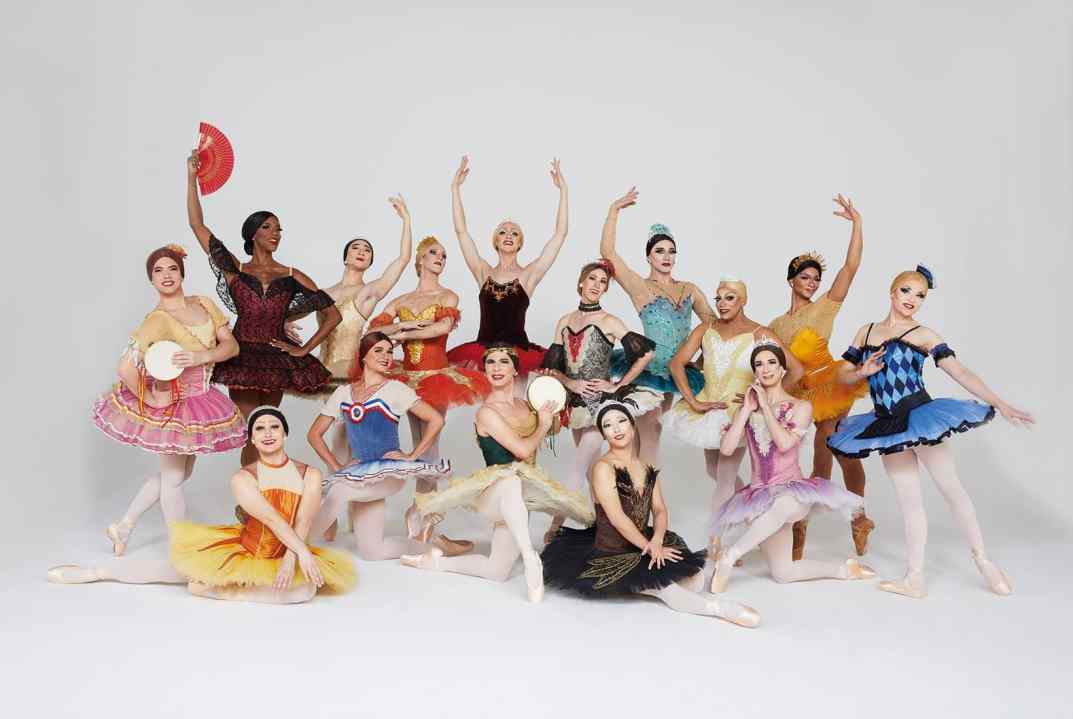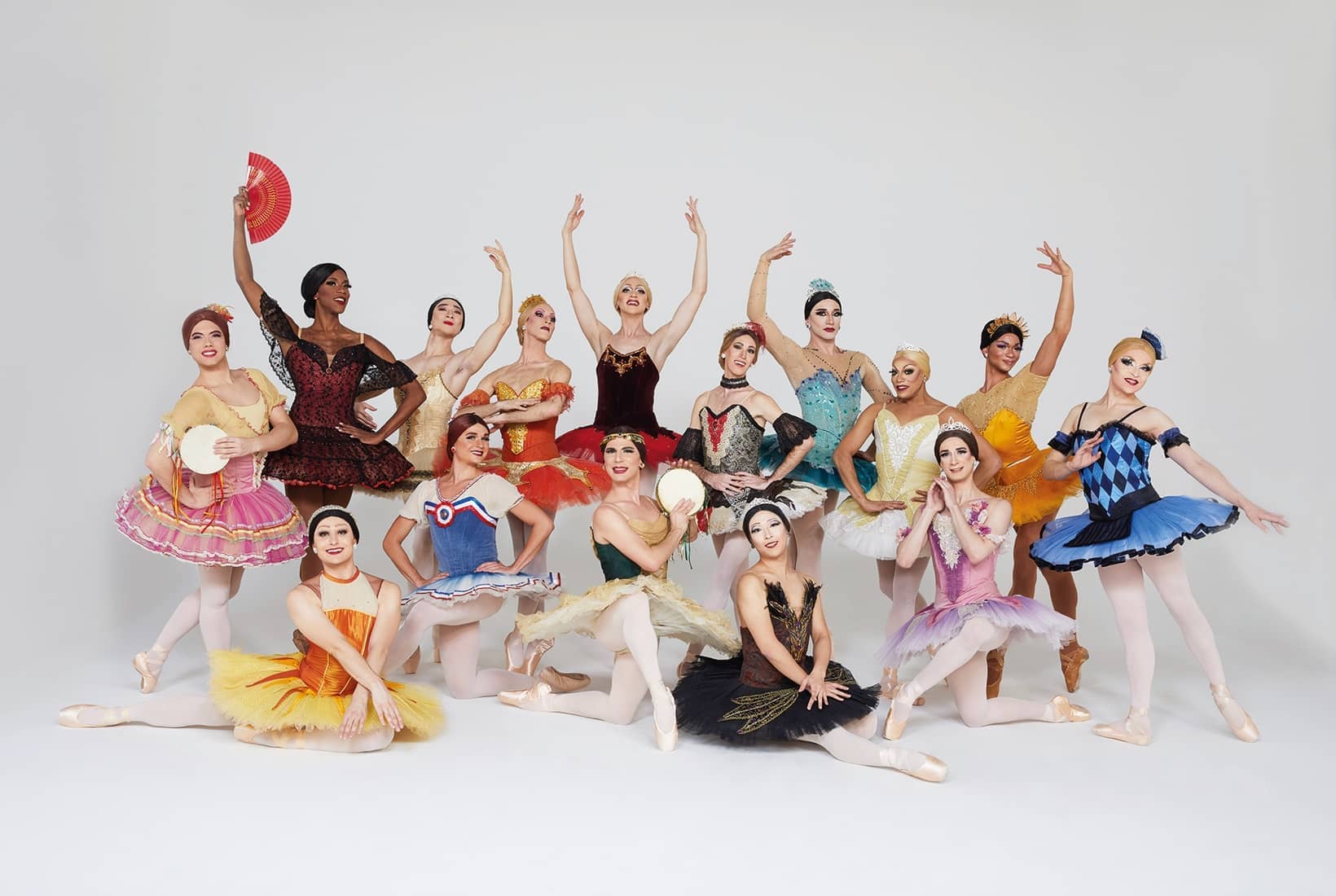Drag isn’t what it was. Pantomime dames, character actors and any number of sketch-show comedians had fun dressing up as harridans or movie stars (check out Benny Hill’s unforgettable Elizabeth Taylor) but those old-school travesti turns have been out-camped by a more unsettling performance style that women are finding increasingly hard to take. Directors and commissioning editors tread very carefully when it comes to ethnicity, sexual orientation and disability but women, it seems, are still fair game. The trampy excesses of the modern drag wardrobe, the cartoonish, almost spiteful exaggeration of female features – haystack wigs, F-cup prosthetics, the whole ‘womanface’ box of tricks – doesn’t feel like an homage any more but a misogynistic send-up, reducing the very notion of ‘female’ to something tawdry and synthetic.
A big man in a tutu and tiara ought to arouse the same unease but somehow Les Ballets Trockadero de Monte Carlo manage to bypass drag’s difficulties. The company was conceived almost as a private joke in 1974, performing in off-off Broadway lofts and they are still on tour nearly half a century later, perpetuating a style of ballet that died out long before most of the current company were born. Rigorously rehearsed, thriftily but authentically staged and meticulously observed, the Trocks are home to the grandest and funniest ballerinas in captivity.
I have been watching the Trocks for 35 years and, despite their demon-queen maquillage, their portrayals are affectionate, even innocent, with none of the seedy, sex-worker vibe inherent in a 21st-century drag act. Next month the 16-man troupe will arrive in the UK for an eight-week, 11-city tour but back in May they were paying a flying visit to Spain and Portugal, adding Zaragoza to the 600 cities they have conquered.
Even the most tutu-averse punter will marvel at the sheer skill involved
Zaragoza’s pretty old Teatro Principal, with its red plush upholstery and gilded, cherubed ceiling, is the perfect setting for the swans and sylphs of the Trockadero repertoire but the city has no real tradition of ballet-going and Spain’s belt-and-braces Covid regulations – they wanted masks on the beaches at one point – meant that box office was initially slow-moving. Backstage the mood was anxious. ‘In theatres of this type the acoustics are great for the audience but we don’t hear much that’s happening in the house,’ says Joshua Thake. ‘When the pre-show announcement happened, I turned to a colleague and said: “Is there anybody here?”’ In fact, the full house was giggling away happily. The Trocks always take care to add local colour to the bogus cast changes on the tannoy and the dig at Les Grands Ballets de Botorrita (a nearby hick town, pop: 498) got a nice big laugh before a step had been danced.
Earlier that day the company was taking class on stage, getting to grips with its dimensions and factoring in the 4.5° gradient of the floor which does wonders for sightlines but plays havoc with a dancer’s equilibrium. ‘Make friends with the rake!’ shouts ballet master Raffaele Morra, former Trock ballerina Lariska Dumbchenko. Morra is running through a brand-new enchaînement, a string of familiar steps shuffled into a totally new order for that day’s class. He ‘marks’ what he wants from them – pas de bourrée, pirouette, attitude – and the watching dancers echo his feet with their hands, muttering the names of the moves, committing the long sequence to memory almost instantaneously. Dancers, like gymnasts and martial artists, have a premotor cortex adapted to this extraordinary skill: see one; do one. Alicia Markova had an eidetic memory for movement, so much so that Diaghilev choreographer Léonide Massine once took her to a flamenco show, then made her dance it back to him, step for step.
There are no tiaras or tutus in rehearsal and there is nothing girly about the usual laundry basket of practice gear until the dancers start peeling off layers and one chap reveals a ruched pink bra (‘He’s gender fluid,’ explains a voice, helpfully). Even in rehearsal the eye is caught by new signing Takaomi Yoshino who trained at St Petersburg’s prestigious Vaganova academy – ‘probably the finest technician we’ve ever had,’ marvels Tory Dobrin, artistic director for the past 30 years. Yoshino (Varvara Laptopova) is quietly boring a hole in the unfamiliar floor with a tornado of triple and quadruple fouettés but even he is upstaged by the physical comedy of Robert Carter (Olga Supphozova) whose body seems to shrink and expand at will: hunchback one minute; swan maiden the next.
The Trocks’ genius is their ability to appeal to all levels. Balletphobes are easily won over by the sheer lèse-majesté of having a great hairy six-footer in a Fonteyn role but, once softened up by gurning and slapstick, even the most tutu-averse punter will marvel at the sheer skill involved, underpinned by thousands of hours of graft. There are a few sly parodies of Balanchine (Go for Barocco) and Jerome Robbins (Yes, Virginia, Another Piano Ballet) but the core repertoire is a sanctuary for old warhorses of the art form no longer seen in the West: Esmeralda; Pas de Quatre; The Little Humpbacked Horse – and the cross-dressed ballerinas do their upmost to inhabit these works in the grandest imperial manner, stealing only from the very best.
A Trock isn’t trying to be a woman, he’s trying to be a ballerina. For the uninitiated the word is a synonym for ballet dancer but serious balletgoers use it very sparingly – and usually in the past tense – to describe the artists of a bygone age. Scratchy old films of the greats – Ulanova, Kolpakova, Plisetskaya – are scanned by Dobrin’s divas for foibles and mannerisms and reprocessed as comedy. The centrepiece of every mixed programme is the old gala staple ‘The Dying Swan’. Anna Pavlova’s four-minute weepie is transformed into a comic tour de force by a Trock on spavined pointes, unpacking three pillows’ worth of loose feathers and shamelessly milking the curtain calls.
These dancers simply aren’t cut out for the chorus. In 2017 a former Trockadero ballerina embarked on a bitter (and ultimately unsuccessful) dispute with the company alleging transphobic discrimination and harassment. English National Ballet, eager to signal its inclusivity, promptly made space at the barre and the ex-star spent a sorry season in the back row of the female corps de ballet – the words ‘sore’ and ‘thumb’ sprang to mind.
Scratch a Trock and you find a man who figured out early on that the ballerina had all the best lines. Duane Gosa, aka Helen Highwaters, came late to classical dance after years at performing arts school. ‘There was a lot of catching up to do and I wasn’t really wanting to be a male ballet dancer, being behind somebody and making sure that they looked good. I wanted the spotlight.’ Like every ballet school bunhead, his dream is to tackle Odette: ‘She’s really dramatic but it’s so silly: she’s a bird. It’s already ridiculous.’
Tall, dark and handsome, his fellow Trock, Joshua Thake, ought to have been a natural Siegfried but his lean lines meant that auditions went badly when he finished his after-school training with Boston Ballet School: ‘I felt that they were looking for a linebacker, football aesthetic type of body.’ Straight ballet gets accused of ‘body fascism’ but the Trocks sidestep all that. Technique and comic timing are all that matters and the bulk of their jokes are height-related, with pint-sized porteurs struggling to lift their Junoesque partners and dancers cast outrageously against type. Thake was born again as Eugenia Repelskii (‘a ballerina whose pungency is undisputed’). ‘He never does anything the same twice,’ admits Dobrin. ‘But he is so creative I don’t care.’ Despite being more than 6ft 6in on pointe Thake hopes one day to tackle Amor in Don Quixote. It’s usually danced by a pocket ballerina, but after more than ten years in Trockland he has an unwavering faith in the company philosophy, size doesn’t matter: ‘That’s the Trockadero magic.’
Les Ballets Trockadero de Monte Carlo are touring the UK from 6 September until 29 October.







Comments